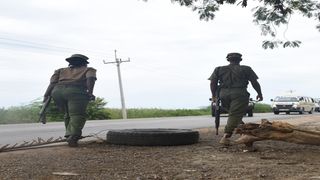
Police officers man a roadblock at Gamba Police Station in Tana River in March 2020.
| Evans Habil | Nation Media GroupPremium
Former terror recruit: Why I’m hiding from police and Al-Shabaab
What you need to know:
- Ali was part of the al-Shabaab group that attacked an entourage of Kenya Defence Forces on the Ijara border when heavy crossfire ensued.
For the last four years, Ali has lived with scars of bullets on his thighs. The scars are a constant reminder of the day he missed death by a whisker.
Ali was part of the Shabaab group that attacked an entourage of the Kenya Defence Forces (KDF) on the Ijara border when heavy crossfire ensued.
Unbeknown to them, the KDF soldiers had word on the attack and used the entourage as bait.
Every time Ali sits to bask in the sun on the banks of River Tana, he remembers that day.
“Six of my colleagues were shot dead and about seven injured. Two were captured. Of the 65 men sent on the assignment, only 35 returned,” he said.
He adds that the number of deaths reported and recorded at the camp was eight soldiers.
“Some of us escaped. They betrayed the course and such was not tolerated in the camp. They would hunt you down,” he said.
Ali’s journey into this theatre of terror began in Eastleigh, Nairobi in 2014. As a Class Eight dropout, he wiped tables and cleaned dishes at a café, earning him Sh9,000 a month.
After a while, Ali’s employer asked him to move to Garissa where had opened another restaurant. He was to become be the supervisor.
Met friends
In Garissa, Ali met friends who appeared to have more money than him, had their houses and run separate businesses on the side.
“Guys would come home to check on business but some never came back. They would claim travelling to get gold across the border or you would hear families say they had shifted,” he said.
Ali developed an interest in the business his friends were getting into.
His mistress had learned of his curiosity and encouraged him to give it a chance.
One day, he was asked to supervise the loading of a truck headed to Ijara. He would later be told to join the team and ensure the food was delivered on time.
The lorry was stopped by some armed men along the way. He and six others were bundled into another truck. A nine-hour journey followed, ending up in a wide field that looked like a military camp.
They were ordered down and immediately taken to a room for a briefing before they could start training.
He saw some of the friends from Garissa on the first day. This gave him a huge relief. The camp, as he describes it, was a diverse area with a mixture of races from several countries.
We had to forget our lives and embrace the end courageously.
His first assignment after training was to attack Gamba police station and free some of their colleagues. Ali’s second was in Mandera at a quarry, where he says they abducted a Kenya Police Reservist and a worker.
“I was to be picked for the Garissa University mission but failed the test twice. In fact, I was suspended from duty for a month,” he said.
Ali’s exit from Al-Shabaab began in 2016 when he was handed an assignment in El Adde, Somalia. He was versed with the terrain as he was among the few sent to survey the place.
“We were informed that the chances of us not returning were 96 per cent, so we had to forget our lives and embrace the end courageously,” he recalled.
During the Ijara battle, Ali was hit in the left thigh twice. He ran for dear life.
Soldiers launched a door-to-door hunt for those who took part in the raid the following day.
He sneaked out that evening by hiding among animals being transported to Ijara. Once in Ijara, Ali trekked to Majengo in Tana River and settled in Bondeni with his in-laws.
“KDF officers arrived at our home in Tana Delta about four months later. They almost killed my mother before taking my younger brother away,” he said.
Ali is happy to be alive, but his four years of freedom have been in hiding. He would wish to surrender but fears for his life.





